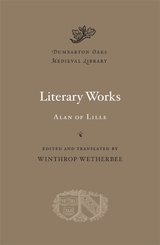
Architrenius, a satirical allegory in dactylic hexameters completed in 1184 by the Norman poet Johannes de Hauvilla, follows the journey of its eponymous protagonist, the “arch-weeper,” who stands in for an emerging class of educated professionals tempted by money and social standing. Architrenius’s quest for moral instruction leads through vivid tableaux of the vices of school, court, and church, from the House of Gluttony to the Palace of Ambition to the Mount of Presumption. Despite the allegorical nature of Architrenius, its focus is not primarily religious. Johannes de Hauvilla, who taught at an important cathedral school, probably Rouen, uses his stylistic virtuosity and the many resources of Latin poetry to condemn a secular world where wealth and preferment were all-consuming. His highly topical satire anticipates the comic visions of Jean de Meun, Boccaccio, and Chaucer.
This edition of Architrenius brings together the most authoritative Latin text with a new English translation of an important medieval poem.

A product of the cathedral schools that played a foundational role in the so-called Twelfth-Century Renaissance, Alan of Lille was renowned for the vast learning which earned him the title of Doctor Universalis. His writings include many significant contributions to the development of systematic theology, but he was also the most important Latin poet of his time, the great age of Medieval Latin poetry. The works included in this volume aim to give imaginative expression to the main tenets of Alan’s theology, but the forms in which his vision is embodied are strikingly original and informed by a rich awareness of poetic tradition.
The “Sermon on the Intelligible Sphere” translates Platonist cosmology into the terms of a visionary psychology. In the Boethian dialogue of the De planctu Naturae the goddess Nature inveighs against sodomy and “unnatural” behavior generally. The Anticlaudianus, viewed as virtually a classic in its own day, is at once a summa of the scholastic achievement of the Twelfth-Century schools and an allegory of spiritual pilgrimage that anticipates the Divine Comedy.

Bernardus Silvestris exemplifies the scholastic culture of his time. Having studied with pioneers in philosophy and science, he became a renowned teacher of literary and poetic composition. His versatility as scholar, philosopher, and scientist is apparent in his masterpiece, the Cosmographia. In alternating verse and prose, this foundational text for later Latin and vernacular literature synthesizes important intellectual movements of the early twelfth century. It owes its deepest debt to the tradition of philosophical allegory, including Plato’s Timaeus, Cicero’s Somnium Scipionis, and the prosimetra of Martianus Capella and Boethius. Bernardus also displays a masterly awareness of classical Latin poetry. Though less widely influential than his great disciple, Alan of Lille, Bernardus is the most subtle of the twelfth-century Latin poets; the Cosmographia has been aptly compared to the poetry of Lucretius and Giordano Bruno, and a copy survives written in the hand of Boccaccio.
In Mathematicus (“The Astrologer”), a Roman hero, faced with an astrologer’s prediction that he will kill his father, resolves to defy fate by committing suicide. This text is the most substantial of the surviving twelfth-century poems based on the ancient exercises in rhetoric known as controversiae, and it illustrates the twelfth century’s concern with astral determinism.
READERS
Browse our collection.
PUBLISHERS
See BiblioVault's publisher services.
STUDENT SERVICES
Files for college accessibility offices.
UChicago Accessibility Resources
home | accessibility | search | about | contact us
BiblioVault ® 2001 - 2024
The University of Chicago Press









